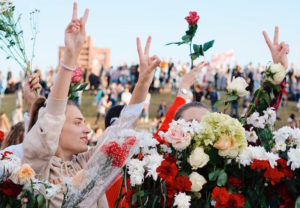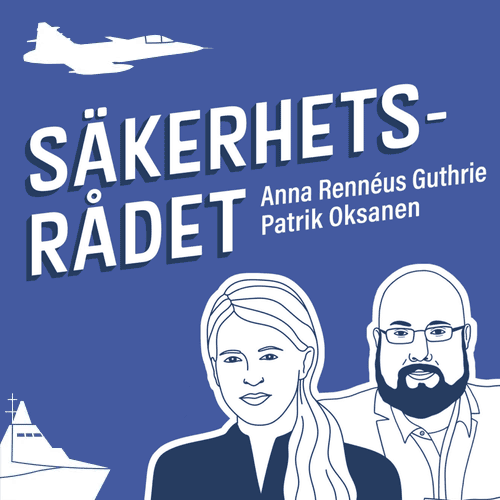This article is part of the Let The World Hear Project, which is a collaboration between Stockholm Free World Forum’s webzine Säkerhetsrådet and a number of Belarusian volunteers. Together we have gathered stories from victims of the dictatorship regime in 2020. The world must know what happened.
Read more about the project here.
This is the story of Lisa from the city of Hrodna, who was arrested with her entire family during an evening walk on the 9th of August 2020.

Women protesting. Photo: Artem Podrez/Pexels
Tell me your story. Where, how and when were you detained?
On the 9th of August we voted. In the evening we decided to go downtown for a walk. The atmosphere was good. Various Telegram channels claimed that people were gathering after the elections, so we decided to go out as well, out of curiosity. We went all together with my family – my husband, my parents, my uncle and I. While we were walking, we met a lot of our friends and acquaintances. Many were out with their children and there were many people with red and white flags. We came to the Sovetskaya Square, which is located in the city centre and decided to sit down on a bench. My friend called me and told me to leave the square, as riot police were approaching. I told my relatives about it, but they said, ”What’s the point of leaving? We are not violating any regulations, we’re just sitting here”.
At one point I turned around and saw that the riot police were nearby. All of them were wearing helmets and carrying truncheons. They lined up with shields in a chain and walked towards the people. The whole crowd started to run away. And naturally the policemen ran after them. We decided to stay and watch. The policemen ran through flower beds and trees in order to catch people.
Avtozaks (ed. note; wagon for transportation of prisoners) started to arrive and the mass detentions started. Police officers began to grab random people one by one from the crowd. I turned around and saw that a bus drove up to us. A man stood and commanded on the radio, ”Take this one… don’t take that one… take those who are filming… take these girls …”. A tikhar (ed note; a police officer without a uniform or any insignia) came up to my dad, uncle and husband. Without introducing themselves, they just grabbed them by their arms and began to drag them into the bus. I rushed up to them and asked ”Why are you taking them?” He shouted ”Step back!”. I carried on: ”Explain the reason for the detention.” And suddenly a female police officer jumped out of the bus, grabbed me by the neck and began to drag me into the bus.
Several police officers caught me, my father and my husband, and threw us into the bus where there were other people. I had to sit in the lap of some male strangers. My mother rushed to the bus and screamed: ”Take me with them, you took my family, take me then as well, because I don’t know what to do!”. The response was: ”Woman, go home.” The female police officer began to choke me without seemingly any reason until someone older in rank asked her to stop.
We were brought to the local police station in Hrodna. Everyone was in a hurry. The police threw us out the avtozak and immediately drove off in order to detain more people. We were separated based on gender – men were taken to one side, I was taken to the other. I was taken to sign a protocol and for an inspection. My mother had been calling my phone during all this time and after a while, a police officer allowed me to answer. Initially, we were informed that we would be detained for about half an hour. Unfortunately, it didn’t turn out to be true. All my personal belongings, including credit cards, were documented and examined, and as a part of the regular check-in, I was asked to squat three times completely naked.
After the inspection I was directed to a cell, if I can even call it that. It was located outdoors – four concrete walls, a concrete floor and just a net on the ceiling. 28 girls were placed in this one space. We stayed there throughout the whole night without any food or water. We were not allowed to leave the cell, there was no toilet and it was very difficult to sit all night on the concrete floor. The girls who were sitting with me had been beaten. They had bruises and one girl had had a chunk of her hair pulled out. We spent the whole night in these awful conditions.
The following day, at around six in the morning, we were informed about a court session that was allegedly beginning at nine. We kept waiting, it was already nine o’clock, then ten… they began to pick us up one by one from the cell. We kept hoping for the best, but instead we got transferred to an even smaller indoor cell, which was probably about 3,5 x 4,5 square meters. There were two wooden bunk beds and one toilet – we were 12 women. There was no water in the cell, there was no air. We all sat there, waiting for something.
Then the court sessions began and we were taken out one by one. First, I had a short meeting with an investigator who was wondering about my iPhone, as well as my education.
During the so-called court session the judge claimed that I had been participating in the demonstrations, read a fabricated witness testimony and ordered me to pay a fine. Afterwards I was released from the detention center, however without my personal belongings.
Some time later, I decided to write a complaint about the riot police, however it turned out that I had to pay a fee to the commission for the official consideration and decided not to proceed with it. Then one by one, me and all my family members were called in for a hearing with an investigator who was trying to find the leaders of the rallies. Once again, I told him the same story of my Sunday evening walk with family, and after a long conservation the fine was surprisingly called off.
After several days of break, we started to participate at rallies. It felt very important to express solidarity with the workers from the major enterprises who had started to go on strikes. I think that we have started a partisan struggle. For example, I often hang red and white ribbons all over the neighborhood, despite the fact that they are constantly cut off.
How was the atmosphere in the detention center?
When we arrived on the 9th of August, I didn’t hear anyone screaming [in pain]. Probably the orders hadn’t been carried out yet, because the following day those who got arrested were beaten. In our case, it wasn’t that scary. Some girls were crying out of despair – one of them had been on a date when she got detained. She looked very fancy in her dress, on heels and with a bouquet of flowers. In the cell, everyone was trying to stay positive, we were singing songs and telling stories. Two tourists from Poland had been detained with us. They kept eating Belarusian sweets in order to deal with the stress. The police didn’t allow them to call the embassy, as they were suspected of espionage and coordination of rallies. It was difficult for them to cope and they barely understood what was happening to them.
Was this your first experience of detention? Have you discovered something new for yourself?
Yes, this experience facilitated my decision-making regarding my relocation to Poland, as I don’t see any future for myself in Belarus. During these past days I’ve lost five kilos, I can’t sleep well, I keep turning around every time I’m outside. I’m afraid that a police bus will pick me up and take me away. Though I’ve realized that I’m strong enough to cope and struggle against the violence. And I’m grateful for becoming emotionally stronger.
Do you believe in victory?
Now, I feel like the wave of rallies and mass protests has slowly been decreasing, because people are fleeing Belarus, and it’s clear that Lukashenko’s electorate will actually remain. I’m frustrated – I don’t want to give up and leave the country, but on the other hand, what if they close the borders and the dictatorship keeps flourishing? I believe in the power of solidarity – only together can we fight the regime and change Belarus into a livable country.
The story was originally told to Nadia C. and translated by Alina A. and Krystsina B.
